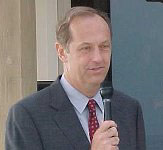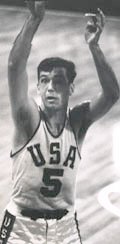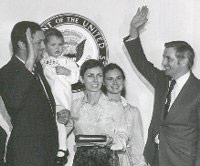Bill Bradley

Outsider vs. insider: Gore's toughest challenger
by Beth Rowen |
This article was posted on August 27, 1999.
 Bill Bradley has proposed strict hand-gun regulations as well as campaign-finance reforms and improved race relations.  In 1970 and 1973, Bradley led the Knicks to NBA titles. "Traveling with my teammates on the road in America was one of the most enlightening experiences of my life." — Bill Bradley  Bradley was sworn into the Senate in 1978. Related Links |
Former New Jersey senator Bill Bradley has fought tough battles on the basketball court and in public office. But his most rigorous contest lies ahead. Indeed, he faces an uphill battle in his bid for the Democratic presidential nomination, with formidable competition from Vice President Al Gore.
Bradley is presenting himself as the alternative to Gore—outsider vs. insider—although the two candidates are ideologically quite similar and it's a stretch for the three-term former U.S. senator to call himself an outsider.
Tighter Gun Control, Campaign-Financing
Fundraising and gun control set the two candidates apart, however most of their views vary only subtly. While both promise to be tough on guns, Bradley's proposals go beyond Gore's.
In addition to a three-day waiting period before an individual can buy a firearm and licenses for gun owners (which Gore also favors), the former senator has proposed mandatory handgun registration and removing gun dealers from residential neighborhoods. Gore has proposed a constitutionally questionable ban on "gang-related" clothing.
Bradley has made campaign-finance reform a central issue in his campaign and has challenged the other candidates of both parties to forgo soft money—donations to political parties rather than individual candidates, which are used in issue-ads that essentially endorse a candidate or his or her views. As an alternative, Bradley has suggested that general elections be publicly financed and that candidates be entitled to free television airtime.
Closing the Racial Divide
Bradley also speaks frequently and passionately about closing the racial gap in the United States. On a recent Meet the Press, Bradley said, "I've always believed that the racial divide in America was our fundamental and deepest challenge. The need to be able to see beyond skin color or eye shape to the individual is tremendously important."
Bradley learned this lesson first hand as a member of the New York Knicks. As a white player, Bradley witnessed discrimination and prejudice at every turn.
"Travelling with my teammates on the road in America was one of the most enlightening experiences of my life," he said in his Internet biography.
Along with a social education, Bradley came away from his 10-year stint in the NBA with two championship rings and a place in the Basketball Hall of Fame. Regardless of his prowess on the court as a high-scoring forward, Bradley has never used - or exploited - his celebrity or celebrity friends for political gain.
Life on the Run
Born on July 28, 1943, in Crystal City, Missouri, Bradley took up basketball in the fourth grade as a way to be "one of the guys." He ended up being the guy, on the court at least. He was named All-American his junior and senior years of high school and scored more than 3,000 points in his high-school career. Scouts lined up at the Bradleys' door. Bradley received 75 scholarship offers in all.
Bradley's accomplishments in college were even more impressive than his high-school feats. He was a two-time All-American, the 1965 Player of the Year, and a Sullivan Award winner. He also captain of the 1964 gold-medal-winning U.S. Olympic team.
He got his first taste of politics as a summer college intern for Rep. Richard Schweiker and while working on the presidential campaign of former Pennsylvania Governor William W. Scranton. During his internship he watched as Congress passed 1964's Civil Rights Act. He has said that from that moment he knew politics was his calling and that he was actually a Democrat at heart. (He had been a Republican.)
Upon graduating from Princeton, Bradley chose a Rhodes Scholarship over the NBA. At Oxford he studied politics, philosophy, and economics. Later he joined the Air Force Reserves and served six months active duty before finally lacing up for the Knicks in 1967.
The Knicks
Bradley's first season with the Knicks was disappointing. Princeton's star forward played guard and never hit his stride. He moved to forward in the 1968-69 season and found his place on the team. The Knicks won the National Championship in 1970 and 1973, beating the Lakers both times.
Bradley met his wife, Ernestine Schlant, in Brooklyn while she was filming a documentary about the poet Marianne Moore. They married in 1974 and had their only child, Theresa, in 1976. Bradley found time to write a book, the 1976 bestseller, Life on the Run, that chronicled three weeks in the life of an NBA team. The book is widely considered a classic in sports literature.
He retired from the NBA in 1977, after having scored 10,439 points in 742 games. He was inducted to the Basketball Hall of Fame in 1982, his first year of eligibility.
A Whole New Game
Barely cooled off after 10 years in the NBA, Bradley began his run for the U.S. Senate in 1977 and was elected in 1978 at age 35, becoming the Senate's youngest member. He immersed himself in his new job, serving on the Finance and Energy and Natural Resources committees, and later the Special Committee on Aging and the Select Committee on Intelligence.
He was re-elected in 1984 and squeaked by in 1990. As a senator, Bradley championed the rights of families and children, putting proposals on child-support enforcement, longer hospital stays for new mothers, and lead paint on the Senate's agenda. Race became his primary focus in the 1990s. And, of course, he has long supported campaign-finance reform.
In his book, The Fair Tax, Bradley outlined his tax-reform plan that proposed fewer tax rates and closed loopholes that benefited special interests. Defying the odds, his plan became the Tax Reform Act of 1986.
Not Abandoning "Public Life"
In 1995, Bradley announced his retirement from the Senate, though he said he was not abandoning "public life." When his third term ended in 1996, Bradley made rounds on the speaking circuit, wrote his memoir, Time Present, Time Past, served as an adviser to J.P. Morgan and the Advertising Council, taught at Notre Dame, and delivered essays on CBS' weekend Evening News.
He is now seeking the most public of all public lives.







